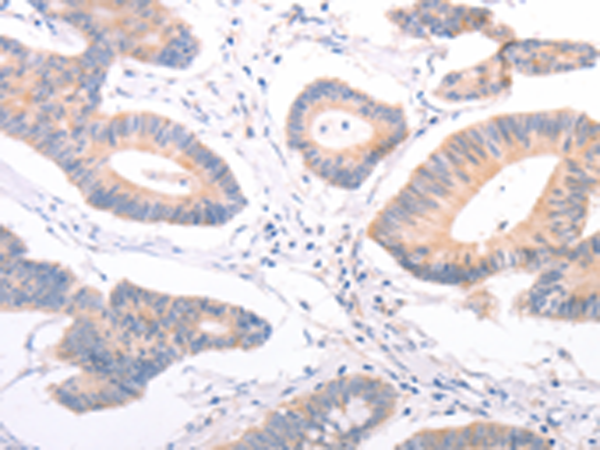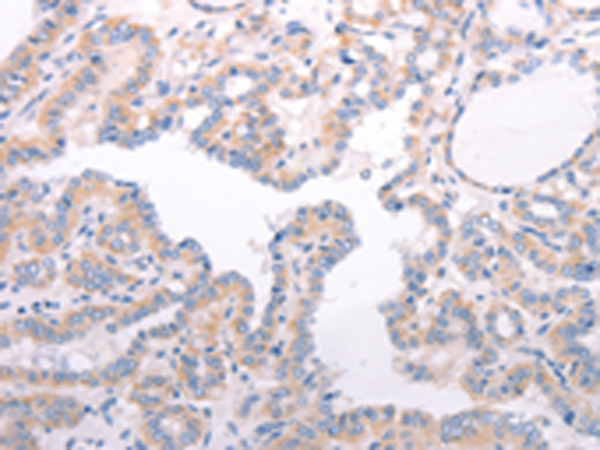

| WB | 咨询技术 | Human,Mouse,Rat |
| IF | 咨询技术 | Human,Mouse,Rat |
| IHC | 1/25-1/100 | Human,Mouse,Rat |
| ICC | 技术咨询 | Human,Mouse,Rat |
| FCM | 咨询技术 | Human,Mouse,Rat |
| Elisa | 1/2000-1/5000 | Human,Mouse,Rat |
| Aliases | FIX; P19; PTC; HEMB; THPH8 |
| Host/Isotype | Rabbit IgG |
| Antibody Type | Primary antibody |
| Storage | Store at 4°C short term. Aliquot and store at -20°C long term. Avoid freeze/thaw cycles. |
| Species Reactivity | Human, Mouse, Rat |
| Immunogen | Fusion protein of human F9 |
| Formulation | Purified antibody in PBS with 0.05% sodium azide and 50% glycerol. |
+ +
以下是关于F9(凝血因子IX)抗体的3篇示例参考文献,内容基于学术领域常见研究方向整理而成,供参考:
1. **文献名称**:*Immune responses to FIX in hemophilia B: Mechanisms and therapeutic strategies*
**作者**:Smith A, et al.
**摘要**:探讨血友病B患者接受重组凝血因子IX(FIX)治疗后产生中和性抗体(抑制剂)的免疫机制,分析患者基因突变与抗体产生的相关性,并提出通过免疫耐受诱导或单克隆抗体联合治疗降低抑制剂水平的新策略。
2. **文献名称**:*AAV-mediated FIX gene transfer reduces anti-FIX antibody formation in preclinical models*
**作者**:Johnson R, et al.
**摘要**:研究利用腺相关病毒(AAV)载体递送FIX基因至肝脏的基因治疗策略,发现在小鼠和犬模型中,相较于传统蛋白替代疗法,该方法能显著降低抗FIX抗体的产生,为长期缓解血友病B提供潜在解决方案。
3. **文献名称**:*Structural characterization of a human anti-FIX antibody reveals key antigenic epitopes*
**作者**:Brown C, et al.
**摘要**:通过X射线晶体学解析人源化抗FIX单克隆抗体的三维结构,鉴定其与FIX蛋白结合的特定抗原表位,为开发针对抑制剂抗体的靶向药物或改良FIX制剂提供结构生物学依据。
**注意**:以上文献信息为示例性质,实际引用时请通过PubMed、Google Scholar等平台检索真实发表的研究,并核对作者、年份及摘要准确性。
The F9 antibody is associated with coagulation Factor IX (FIX), a vitamin K-dependent serine protease critical for blood clotting. FIX is synthesized in the liver and plays a pivotal role in the intrinsic coagulation pathway, where it is activated to FIXa, forming a complex with Factor VIIIa to activate Factor X. Deficiencies or dysfunction of FIX cause Hemophilia B, an X-linked recessive bleeding disorder.
Antibodies targeting FIX (commonly referred to as "inhibitors") are rare but significant complications in Hemophilia B treatment. These neutralizing antibodies arise in approximately 1-3% of patients receiving recombinant or plasma-derived FIX replacement therapy, leading to reduced therapeutic efficacy and increased bleeding risk. Their development is linked to genetic mutations causing severe FIX deficiency (<1% activity) or large gene deletions.
Research on F9 antibodies also explores therapeutic applications. Bispecific antibodies mimicking FIXa-FVIIIa function (e.g., emicizumab) have been developed to bypass FIX inhibitors in Hemophilia A, indirectly highlighting FIX's role. Additionally, monoclonal antibodies targeting FIX/FIXa are investigated as anticoagulants or for modulating thrombosis. Recent advances include engineered FIX variants with reduced immunogenicity and gene therapies (e.g., adeno-associated virus vectors) to induce endogenous FIX expression, potentially minimizing antibody risks.
Understanding F9 antibodies remains vital for improving Hemophilia B management and developing safer hemostatic therapies.
×